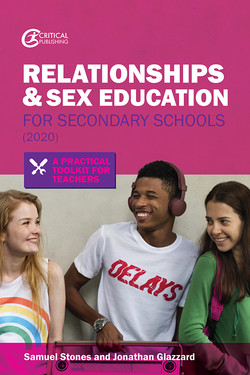Читать книгу Relationships and Sex Education for Secondary Schools (2020) - Samuel Stones - Страница 8
На сайте Литреса книга снята с продажи.
ОглавлениеINTRODUCTION
This book addresses the statutory guidance published by the Department for Education (DfE) for Relationships and Sex Education (RSE) in secondary schools. This guidance replaces previous guidance that was published 20 years ago. The new guidance reflects contemporary societal issues and ensures that young people understand what constitutes healthy relationships, including friendships, intimate relationships and marriage.
The statutory guidance includes important aspects of subject content including consent, sexual harassment, sexual violence, and sexual exploitation and coercion in relationships. In addition, young people must learn about the effects of pornography and online risks including grooming. There is an emphasis on young people understanding the characteristics of unhealthy relationships and on protecting their mental well-being. Abuse, female genital mutilation and honour violence are also identified as subject matter within the statutory guidance. It is important that children learn what is lawful and unlawful.
The guidance states that young people should explore sexual orientation and gender identity ‘at a timely point’ (DfE, 2019a, p 26) and also that ‘schools may choose to explore faith, or other perspectives, on some of these issues in other subjects such as Religious Education’ (DfE, 2019a, p 26). A well-designed curriculum will ensure that young people recognise and understand the harmful effects of prejudice-based bullying and stereotypes. There is an emphasis on teaching young people about different types of relationships, including same-sex relationships and same-sex marriage, and on teaching children about the importance of mutual respect and self respect.
Character education is embedded through the guidance so that young people learn about the importance of positive character virtues within the context of relationships. Schools will need to take into consideration that the character virtues that are being promoted through both the formal and hidden curriculum may be different to the character virtues that are promoted within the context of families and communities.
In designing the RSE curriculum, schools will need to ensure that appropriate consultation has taken place with parents. Parents need to know what will be taught, when it will be taught and how it will be taught. Parents retain the right to withdraw their children from Sex Education but not from Relationships Education.
This book addresses the content of the new statutory guidance. There are aspects of the guidance that will be more challenging for schools to address and these are highlighted throughout the book. The content of each chapter is supported by case studies of practice which are designed to support schools to implement the guidance.
